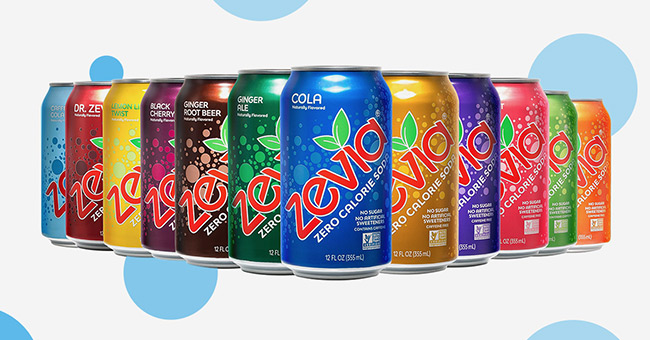Nearly one year removed from the company’s IPO filing, zero-sugar soft drink maker Zevia has announced a changing of the guard. Paddy Spence will cede his longtime role as CEO to President Amy Taylor on August 1, but remain Chair of the Board after he steps down.
Spence has led the company since buying the zero-calorie beverage brand in 2010 when it was posting $7 million in sales and has helped shape it into a publicly-traded company boasting $138 million in net sales for 2021.
“Amy and I have worked side-by-side during Zevia’s transformation, and she has been instrumental in developing and implementing our strategies for driving future growth and profitability,” Spence said in a statement.
Taylor was brought on as a member of the board in March 2021 and took on the position of president during the company’s IPO. Previously, she had spent two decades at Red Bull North America where she worked her way to the position of president and CMO for the last two years of her time there. Taylor was dismissed from the energy drink maker after she made controversial comments about the company’s lack of public statement in light of the murder of George Floyd.
The announcement is reported to be the “culmination of a succession planning process” by the board. In her statement, Taylor said that she sees “exciting opportunities ahead, including further channel and geographic expansion” as well as a “brand refresh” expected to arrive in the second half of 2023.
Since launching in 2007, Zevia has moved beyond its roots as a stevia-sweetened, zero-calorie soda option and expanded into other beverage segments like energy drinks, iced teas, mixers and children’s fruit drinks. It has seen continued success in the warehouse club, c-store and e-commerce channels.
Zevia executives hope to eat into the energy and iced tea categories by riding its credentials as a plant-based beverage brand that utilizes stevia, opposed to refined sugar, as its sweetener.
In the Q4 2021 earnings call, Spence talked about “building a marketing story” for Zevia’s energy drinks and hopes that the “end-to-end” re-brand will help increase visibility for the energy portfolio.
Recently, the company added Denise Beckles as CFO and Zevia’s independent director, Quincy Troupe, took on the role of COO chief operating officer. Troupe – formerly the SVP of supply chain at Boston Beer Company – joined the company’s board at the same time that Taylor took over as president in June 2021.
According to the most recent Nielsen data, Zevia is the largest independent brand in the low-calorie, carbonated beverage category with $126 in dollar sales in the 52-week period ending June 6. On a three-year stack, dollar sales were up 69.2% in a 52-week period.
During the most recent earnings call on May 12, Taylor reported that the brand “gained another 1.3 million households, a 22% increase to yield a 5.8% penetration” with “over 500,000 new households from the club channel alone” representing 45% growth in the club channel alone for Q1 2022.
Zevia reported $38 million in sales for Q1 2022, up 24% from the same period last year; yet, experienced a net loss of $17.5 million for the quarter citing inflation, freight costs and higher marketing investments were to blame.
In a Goldman Sachs research report from last year, analysts expressed “increased confidence” in the company’s growth potential. Zevia has leaned into its B Corp status and its ESG priorities to build a brand that markets to consumers who value social impact companies. The brand only uses aluminum cans (instead of plastic containers) and praises its use of stevia as reducing thousands of metric tons of sugar from consumers’ diets.
Taylor expressed her confidence in the brand being “well positioned to weather economic downturns” because it is a home stocking brand with a core business in take-home multipacks.
